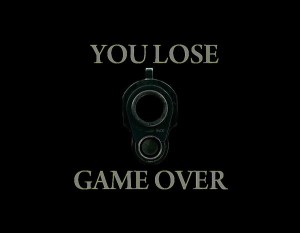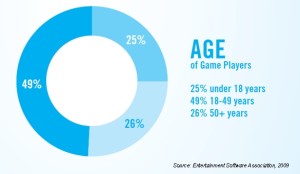Modern Gamers Have No Time For Defeat
by NorseGamer, HSM Publisher
“Skip it.”
–The Bard’s Tale
There are, in fact, a number of games I’ve never completed.
We’re not just talking about classic titles, either — from that golden age thirty years ago when games in general were considered harder because they didn’t hold your hand, and shamelessly extended gameplay hours by torturing you with relentless and brutal level designs. Everyone more or less agrees that the original Ninja Gaiden, for instance, was a game designed by someone who simply hated humanity, because BLEEP, that game was harder to beat than a chess match with Garry Kasparov. And as much as I love a lot of my old games from the Apple ][e, Atari 2600 and NES, the reality is that most of them beat me.
Here’s the weird part: I didn’t care.
Maybe it’s because I had no frame of reference. When you’re a small child, everything is new and exciting. And you have time on your side, because — if you’re one of the millions of brown-haired suburban kids who grew up during the last vestiges of the analog world — you didn’t have tons of responsibilities or distractions to contend with.
Somewhere along the line, though — and I’m not sure where — it became important to beat the game. It became important to win.
 Perhaps that psychological transition took place when game acquisition meant spending my own money, rather than being gifted something by the parents. After all, when you’ve spent your own cash on something, you want to get your money’s worth out of it. Or maybe it stems from a sense of needing to control and achieve; as we get older, it often feels like we have less control over our lives, and defeat and frustration slowly encroach upon the youthful sense of adventure. Hell, maybe it was the advent of trophies, and the keep-up-with-the-Joneses mentality it produced, which made the difference.
Perhaps that psychological transition took place when game acquisition meant spending my own money, rather than being gifted something by the parents. After all, when you’ve spent your own cash on something, you want to get your money’s worth out of it. Or maybe it stems from a sense of needing to control and achieve; as we get older, it often feels like we have less control over our lives, and defeat and frustration slowly encroach upon the youthful sense of adventure. Hell, maybe it was the advent of trophies, and the keep-up-with-the-Joneses mentality it produced, which made the difference.
One thing that’s nearly universally agreed upon, though: modern AAA games spend a lot more time handholding the player, and are usually easier to beat.
Why?
I really do wonder if we, as gamers, simply have no patience for defeat any more. There are so many games available today, all screaming for your attention — a problem that only got worse with the explosion of F2P freemium games on mobile platforms, as an asymmetric response to the business trends driving the console industry — that the unspoken covenant between gamer and designer has changed from, “Play this game long enough and you’ll master it,” to, “Play this game and we promise you’ll feel good about yourself.”
 Quick litmus test: you download a game (or even a game demo). You play it. Unfamiliar with what to expect and the nuances of the control scheme, you lose. Do you:
Quick litmus test: you download a game (or even a game demo). You play it. Unfamiliar with what to expect and the nuances of the control scheme, you lose. Do you:
A.) Try again, and keep trying until you get it right, or
B.) Blame the game for its poor design and shelve it, never to revisit it.
When we were kids, the majority of us would probably have answered A. Today, if we’re honest, I suspect a lot of us would fall under the B category. Myself included.
Case in point: I recently downloaded the demo for NBA Jam on my PS3. When I was a youth, I loved playing the original Super NES version. After half an hour of trying to figure out the controls and reproduce all the cool stuff I remembered doing back in the day, I gave up in frustration and switched the game off. Frankly, EA would’ve been better off not providing a demo — at least that way they could’ve gotten an impulse purchase out of me before I grew frustrated.
Another example: Vandal Hearts: Flames of Judgment. I’ve put hundreds of hours into the previous two Vandal Hearts titles. I love S-RPG games. And I was happily sailing along with the latest installment on PS3, frankly bored with the lack of challenge, up until the final boss battle. All of a sudden, the difficulty curve looked more like a shuttle launch. And I shut it off after a few defeats, never to return.
What the hell has happened to me?
 I personally think that, after more than three decades of playing video games, my preferences have gotten so narrow and tightly defined that not only does a game have to flawlessly meet my criteria to get me to shell out any money for it, but a game has to do damn near everything conceivable to keep me from failing, lest I switch it off.
I personally think that, after more than three decades of playing video games, my preferences have gotten so narrow and tightly defined that not only does a game have to flawlessly meet my criteria to get me to shell out any money for it, but a game has to do damn near everything conceivable to keep me from failing, lest I switch it off.
I don’t like what this says about me. But I’m also unwilling to change. My most valuable commodity is my time, and I’ve gotten to a point where I won’t invest it in a game (for recreational purposes, anyway) unless I feel confident that it’s going to be worth the experience. And that experience is no longer simply playing the game; that experience is being able to say I can demonstrate my ability to “master” a game. Defeat simply isn’t acceptable any more. The experience of having played a game simply isn’t enough any more. It’s about winning.
(Side note: I sometimes wonder if this is why PlayStation Home has an “uncool” reputation with the gaming community at large — because, up until very recently, there were no objectives to complete and no trophies to earn, it attracts a completely different type of gamer, who may be viewed by outsiders as someone who can’t cut it in the “real” gaming world. Trophy support and Home challenges should hopefully change this. And I’m saying that as one of the few people who can legitimately lay claim to having “won” the game of Home.)
 This sort of insulation from failure is blatant throughout the industry now. Play Assassin’s Creed IV. Fall from a crow’s nest after getting stabbed down to practically no health by a rifleman. You will plunge some ungodly distance to the deck below — and survive. You actually have to work at letting the game beat you — and when you do lose, you don’t die. You “desynchronize.”
This sort of insulation from failure is blatant throughout the industry now. Play Assassin’s Creed IV. Fall from a crow’s nest after getting stabbed down to practically no health by a rifleman. You will plunge some ungodly distance to the deck below — and survive. You actually have to work at letting the game beat you — and when you do lose, you don’t die. You “desynchronize.”
AC IV was the PlayStation Blog’s Game of the Year. It’s also the only PS4 game, so far, that I’ve put any serious time into — because it made me feel good about playing it.
Want an even more glaring example? Play Grand Theft Auto V. Back when GTA3 was out, we used to spend hours beating some of the harder missions — because if you didn’t beat it, you couldn’t progress. So you can imagine my reaction when I got to some particularly tricky sequence in GTAV, got my ass handed to me three times in a row, and was just about to shut the game off in anger when the prompt to skip the entire sequence showed up on my screen.
I couldn’t believe it.
And, of course, I clicked the X button.
Don’t look at me like that. So did you.
To a certain extent, I understand the counter-arguments within the “hardcore” gaming community about how soft games have become today. If everyone can achieve the same experience, regardless of how much or little effort was involved, then — for some — it cheapens that experience. It’s not just enough to have the trophies, the medals, whatever flavor of tchotchke is in vogue; it’s about being able to have the bragging rights that you can do something a lot of other people can’t do. That you earned something.
Here’s the catch: you can’t build a sustainable industry on that kind of hardcore gaming any more. AAA titles cost tens (or hundreds) of millions of dollars to produce, and that has to be recovered. Meanwhile, on the other end of the spectrum, you’ve got such a flood of cheap throwaway games on PC and mobile devices that for any conceivable genre you have an interest in, there are fifty-bajillion copycat games, offered on the cheap (or freemium), all trying to stand out.
 Scarcity can drive difficulty curves. But if there’s one thing the games industry doesn’t lack right now, it’s scarcity. And since the ESA says the average video game consumer — the bread basket of where the money’s coming from — is basically my demographic, then you have to cater to your audience if you want to survive.
Scarcity can drive difficulty curves. But if there’s one thing the games industry doesn’t lack right now, it’s scarcity. And since the ESA says the average video game consumer — the bread basket of where the money’s coming from — is basically my demographic, then you have to cater to your audience if you want to survive.
Frankly, this may not be such a bad thing for the industry. Because game design is constantly evolving. Right now, the real challenge is in creating a game that feels challenging — that feels like it has no safety net — while disguising as cleverly as possible all the safeguards, in order to minimize the sense of handholding and thus maximize the player’s feeling of triumph. As long as the majority of the consumer base’s money wants this type of experience, that’s what’s going to drive the industry.
Ask yourself this: if you’re bemoaning how easy games have become today, would you really want them to be as hard as they used to be? Or are you just saying it because of the bragging rights? Be honest.
The good news is that this medium is still fairly young. And who knows what the next major trend in game design will be? Currently, a lot of people are jumping on the procedural-generation bandwagon — which is odd, since it’s been around for a while — as the new “it” trend. I wonder what will come after that.
I guess the good news is that, as a consumer, I kinda help to decide it. With my wallet.
Share
| Tweet |




 LinkedIn
LinkedIn Twitter
Twitter
You’ve taken the words out my mouth in quite a few sentences here, and I’d agree with the majority of this piece but a few things here shocked me. The idea that there’s a “skip” button in GTA5 for one thing, if I’d have seen that, it woulda felt like a patronizing head-stroke that I’d have lashed out at; that would have made me REALLY angry at the mere suggestion.
“aww, you poor sausage-fingered babeee, you want momma to do this nasty, mean, UNFAIR bit for wittle pweshos woo?”
No. Way. I understand that in a general public fairness kinda way, I mean, you paid for the content, it’s your content and so you shouldn’t be restricted from it. For all intents and purposes it evens the playing field and allows those less used to games to still see the whole story, I get that; I understand that completely. However, I’m from a time where games gave you three lives and no continues, one-touch-kills and the loss of every useful or hidden item you can find in the game upon death. A time when you really did MASTER a game. You either learned it inside out and became God-like in its world, or shut your girl-hole and went home.
There are so few games like that now; Daemon’s Souls or Don’t Starve are about the only ones that spring directly to mind right now and that’s the problem. You want cool, extra hidden content that’s generally acquired with hard lessons and punishing challenges? Sure, just give us £5 and we’ll beam them into your game with the magical elves of the internetz delivery system.
I will admit, I like the story in my games to flow, but not so much it all feels scripted or even like a movie take. It’s an incredibly difficult tempo to get right, but when a developer can, you get magic like Arkham Asylum or the Uncharted series. And that, now, is where I see quality in my games; and how I judge them.
I could say more but, damn I need my morning coffee and nicotine. GREAT read Norse, thanks.